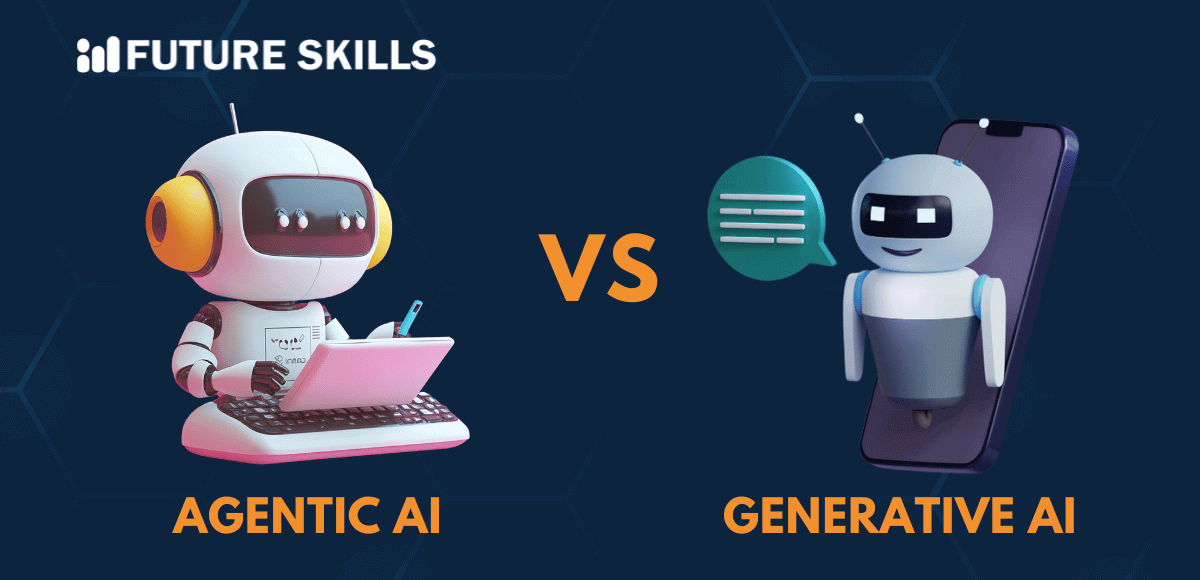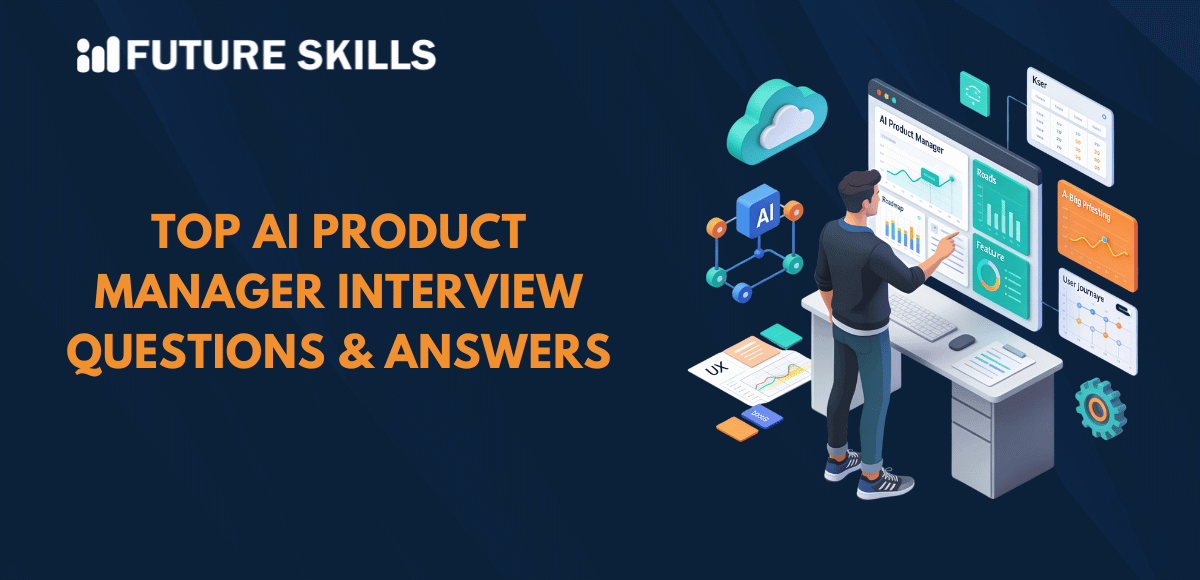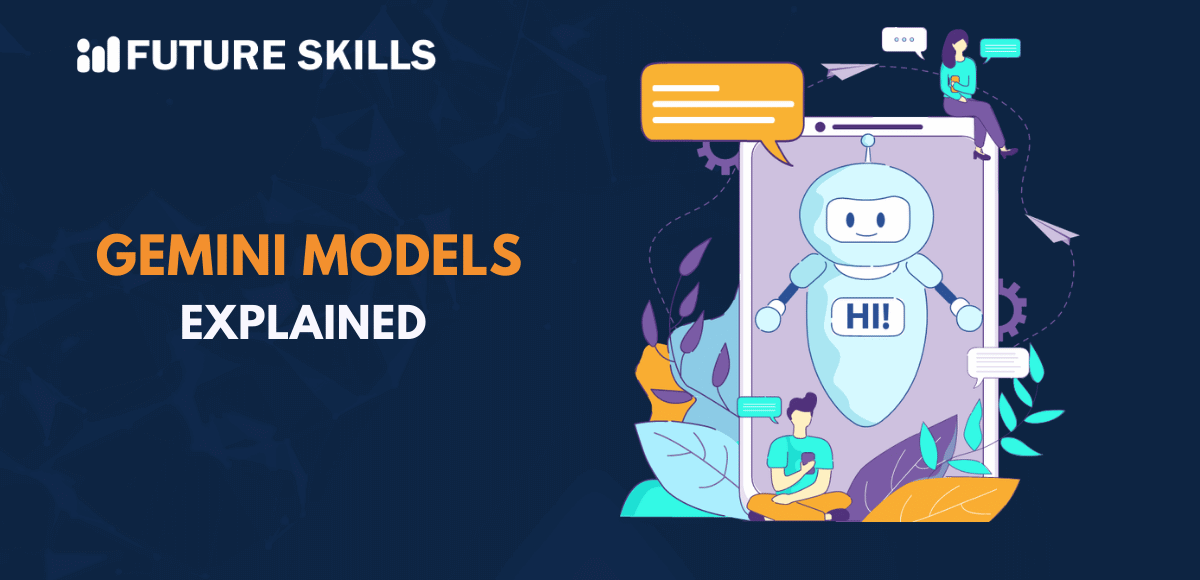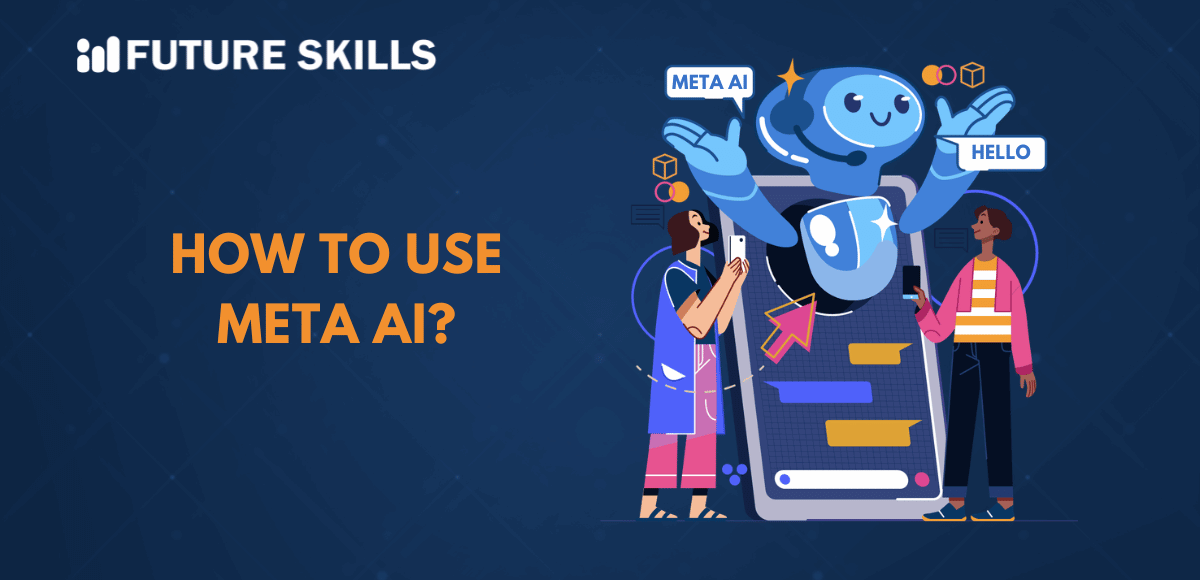The boundaries of the Artificial Intelligence industries are rapidly expanding. Currently, two of the most popular AI developments are Generative AI and Agentic AI. Although these concepts are part of AI technology, they function in different ways. If you wish to comprehend the true potential of AI, it is essential to address the question: What is the difference between generative and agentic AI?’ It is fundamental for individuals and businesses to understand the Agentic AI vs Generative AI difference. This insight will help leverage these AI capabilities effectively to achieve specific goals. Let’s get into it and shift our attention toward agentic AI and generative AI comparison.
Learn artificial intelligence with our structured AI Certification Course and explore new career opportunities.
What is Agentic AI?
Before understanding the difference between Agentic AI and Generative AI, you need to have clear insight into these AI concepts. Agentic AI primarily focuses on automation. This type of AI can perform tasks autonomously. By capitalizing on the capabilities of Agentic AI, users can achieve specific goals.
The emergence of Agentic AI showcases AI’s capability beyond simple output generation. Instead, AI technology can make decisions and take action. Furthermore, it adapts to dynamic environments and situations to efficiently achieve users’ objectives. A key feature that sets Agentic AI apart is its ability to act with a specific purpose. Agentic AI has emerged as a transformative force capable of redefining human interaction with artificial intelligence.
What is Generative AI?
Generative AI is the type of AI technology that generates or creates new content. Therefore, with the help of AI, users can easily produce texts, videos, images, and music. All you have to do is give instructions in the form of prompts. Then, Generative AI will respond to your request by producing appropriate content.
Presently, Generative AI has gained a reputation as the imaginative part of AI. You can leverage the core capabilities of generative AI, and it will create original and authentic content for you. It functions by learning from the existing data. Furthermore, it makes use of this knowledge to imitate the creativity of humans while producing outputs.
Level up your ChatGPT skills and kickstart your journey towards superhuman capabilities with Free ChatGPT and AI Fundamental Course.
How is Agentic AI Different from Generative AI?
As you are now familiar with agentic AI and generative AI concepts, it is time to look at their core differences. To optimally use these AI technologies in the real world, you should be able to grasp their respective functionalities and features. An in-depth agentic AI and generative AI comparison is presented below:
-
Fundamental goal
While discussing the topic of generative AI vs agentic AI, one of the main differences revolves around the goal of these AI technologies. In the case of agentic AI, the ultimate goals involve achieving objectives of users, making decisions, and executing actions. Another unique aspect of agentic AI is the fact it does not rely on human input on a continuous basis.
When it comes to generative AI, the fundamental goal of AI is to create content based on users’ input. Moreover, while framing responses, it tries to mimic the creativity of human beings. It heavily relies on human beings since they provide instructions and prompts based on which generative AI functions.
-
Functionality
While looking at the core functionality of generative AI and agentic AI, a core observation is the marked difference between their respective functional aspect. Agentic AI is capable of analyzing the environment. It can also make decisions in an independent manner and make adjustments to its actions to ensure the objectives of users can be optimally met.
Generative AI technology utilizes large databases for the purpose of learning patterns. It relies on such learning patterns to produce new content which is aligned with the instructions and input of users.
-
Involved technology
Technology plays an instrumental role in both generative AI and agentic AI. However, the type of technology used varies. In the case of agentic AI, reinforcement learning plays a major role in shaping its capabilities and functionalities. Additionally, technologies such as robotics frameworks, decision trees, and sensor fusion enable agentic AI to carry out a diverse range of tasks. In generative AI, the major types of technologies used include transformer models and generative adversarial networks. These technologies help generative AI to generate content for users.
-
Type of output
While discussing generative AI vs agentic AI, a major difference centres around the output type. Agentic AI is able to produce functional outputs for users. Thus, it is capable of navigating decisions, executing tasks, and generating problem-solving actions on the basis of the given context.
The output of generative AI fundamentally involves creative content. Moreover, it could be in the form of images, music, and other formats. It is essential to bear in mind that the generated output is typically non-functional. Therefore, its purpose is to inform or inspire the user.
-
Major strengths
Both generative AI and agentic AI have distinctive strengths. When it comes to agentic AI, its core strength lies in its high efficiency. Apart from being efficient, agentic AI tools are known for their autonomous capabilities. The strength of the novel technology also lies in its ability to scale complex scenarios involving decision-making.
The major strength of generative AI includes its top-notch excellence when it comes to creativity. Some of its other strengths are the ability to automate content and strengthen human innovation by generating huge volumes of content.
-
Limitations
Just like generative AI and agentic AI have distinctive strengths, they also have specific limitations. In agentic AI, a major limitation revolves around the complex nature of the technology. It might be quite challenging for users to implement it in a practical setting. Furthermore, one has to take into account ethical aspects as the decisions may give rise to diverse implications. A major limitation of generative AI is that the quality of its output depends on input and training data. In addition, generative AI is also capable of producing biased output in some cases.
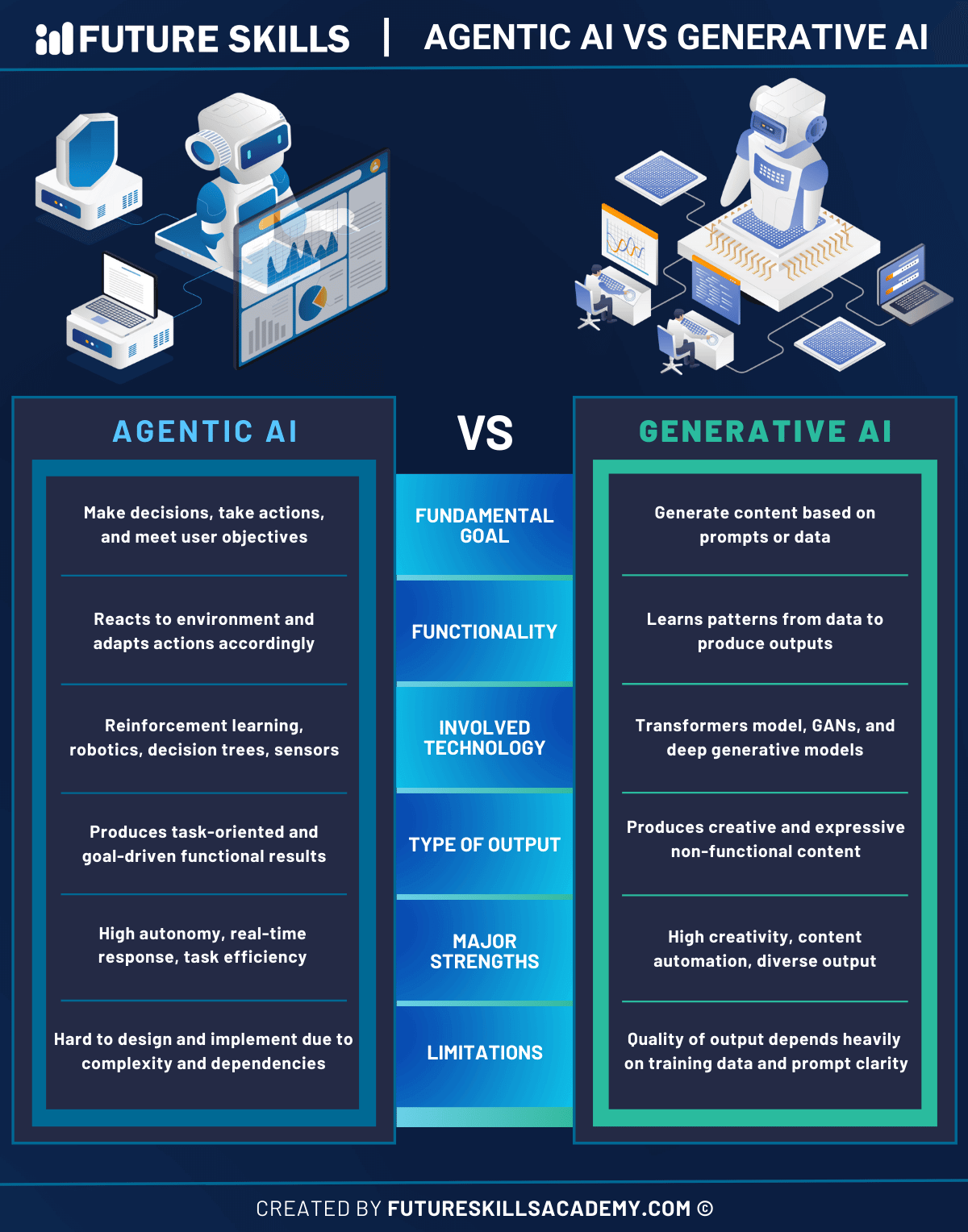
Use Cases of Agentic AI
In order to get a comprehensive idea of the differences between agentic AI and generative AI, you must take into account their application in the real-world setting. The top use cases of Agentic AI include:
-
Supply Chain Management
Modern business entities are integrating agentic AI capabilities into their supply chain networks. It has enabled them to manage their inventory in an autonomous and independent manner. Furthermore, it has also given them the opportunity to optimize the delivery route.
-
Business decision-making
Currently, business entities across diverse industries are capitalizing on agentic AI to automate their decision-making process. It has certainly led to an improvement in the efficiency of the decision-making process.
-
Cybersecurity
With the help of agentic AI, it is possible to detect cybersecurity threats and risks on a real-time basis. Organizations can identify suspicious elements in a timely manner and promptly respond to them. Moreover, by integrating agentic AI capabilities it is also possible to automate tasks pertaining to regulatory compliance.
These use cases showcase the immense promise and potential that agentic AI holds in the real world. With the rapid advancement of AI technology, the relevance of agentic AI may further reach new heights. Thus, in the future, the application of agentic AI may widen further, showing its utility.
Become a certified ChatGPT expert and learn how to utilize the potential of ChatGPT that will open new career paths for you. Enroll in Certified ChatGPT Professional (CCGP)™ Certification.
Use Cases of Generative AI
Today, generative AI is being used as a transformative tool by individuals and business organizations for diverse purposes. In fact, it is revolutionizing various areas and processes. Some of the use cases relating to generative AI include:
-
Chatbots
Many businesses are using generative AI technology in chatbots and virtual assistants. It has created an opportunity for them to streamline the customer service process. Additionally, they are able to curb their operational costs by automating responses to customer queries.
-
Document processing
The impact of generative AI has been revolutionary for organizations especially when it comes to document processing. With the help of the novel AI businesses are undoubtedly able to automatically extract and summarize data from numerous documents. As a result, generative AI has made it possible for entities to gain valuable insights in an efficient manner.
-
Product development
By leveraging the core functionalities of generative AI, firms are able to produce diverse design prototypes. By providing appropriate input, firms are speeding up the ideation process today. Moreover, they are also able to bring about significant improvements in existing products. Thus, the product development process has undergone a remarkable change due to the application of generative AI.
The use cases of generative AI reveal that technology is acting as a transformative force in diverse settings. Its strengths and capabilities are being strategically used for varying purposes in the business world today.
Enroll now in the AI for Business Course to understand the role and benefits of AI in business and the integration of AI in business.
Final Words
At present both generative AI and agentic AI have surfaced as ground-breaking AI technologies. These innovative concepts have been reshaping the AI landscape. Although generative AI and agentic AI are types of Artificial Intelligence technologies, they have distinctive capabilities. The thorough agentic AI and generative AI comparison can surely help you understand their true potential in the practical setting.
The differences between agentic AI and generative AI have been presented by focusing on diverse areas such as goals, functionalities, technologies used, type of outputs, strengths, and limitations. By understanding their differences, these technologies can be leveraged optimally by individuals and businesses alike.

